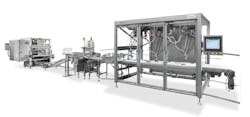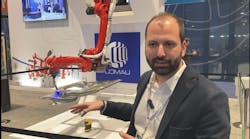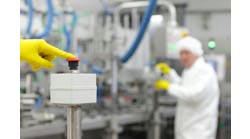Dan Hebert is senior technical editor for Control, Control Design and Industrial Networking. Email him at [email protected] or check out his Google+ profile.
Bosch Packaging Technology in New Richmond, Wisc., manufactures a wide range of packaging machinery including horizontal flow wrappers, vertical form-fill-seal baggers, carton formers and closers, case packers, pick-and-place delta robots for feeding and top loading, and bag sealers. These machines package products in food, confectionery, pharma/medical, personal care, pet food and other industries.
According to product manager Paul Garms, Bosch provides system integration services to its customers in many instances. "For a large confectionery company, Bosch worked in close collaboration with the customer to design a vertical form-fill-seal (VFFS) packaging line that included secondary packaging, ran at high speeds, and was flexible enough to handle the company's wide range of products, package styles, and carton and case configurations," Garms explains.
SEE ALSO: Beware Third-Party Integration
Bosch not only integrates its own machines, but it also can accommodate equipment from other suppliers. "In addition to the VFFS bagger, the line featured Bosch delta robotics and a third-party case erector, check-weigher and sealer that were integrated by Bosch," Garms adds. "Bosch will incorporate additional machines from outside companies as necessary to help customers manage the overall project."
Source: Bosch Packaging Technology
Each line was fully assembled and tested with the customer's products at the Bosch facility in New Richmond prior to shipment and installation at the customer site. "The line's quick vertical start-up, flexibility and high OEE resulted in additional orders from the customer for the same line configuration for other plants and products," he notes.
Bosch markets its system integration capabilities as Module++. "We can integrate standard, modular machines into an automated line with options specific to each customer's application," Garms says. "Whether they're automating their product handling to feed a single machine or automating a complete line with primary and secondary packaging operations, our Module++ expertise makes the process easier for them."
Integration requirements are considered early in the project phase to ensure compatibility with existing processes, and the use of standard machines reduces required engineering. This results in shorter delivery times and considerably lower investment costs than completely customized solutions. "Typically, the engineering expense involved in Module++ solutions is less than 3% of the order," Garms claims. "We also have testing facilities, so that all lines can be completely integrated and thoroughly tested with our customers typically attending factory acceptance tests prior to installation at their facility."
This article is part of the December 2013 cover story, "System Integration Break Through."






